“Charades” is an enjoyable homage to 1960s screwball sitcom hijinks that is undercut by the rather shaky (and increasingly annoying) science fiction trope about splitting a multiracial person in two. This is not to say that the episode handles that topic itself that badly, but I’ll get into that later.
Enterprise is on a slow cruise through the Vulcan system on its way to the moon of Kerkhov, home to an ancient civilization that could be the site of great archaeologic discovery. The downtime is great for the crew, especially Nurse Chapel (Jess Bush), who is preparing to interview for an internship with the great Dr. Roger Korby on Vulcan. She is, however, pointedly avoiding Spock (Ethan Peck), who is also doing his best to avoid her in return.
Spock has been busying himself with work and preparing to meet T’Pring (Gia Sandhu) and his future in-laws for a Vulcan engagement ritual. It is, as they say, “a big thing” – though not, apparently, as big a thing as Spock having to take Chapel along as a passenger when they do a shuttle flyby of the Kerkhovian moon. It’s painfully awkward… right up utnil an anomaly above the Kerkhovian ruins snags the shuttle and gives it a good ol’ Star Trek zap.
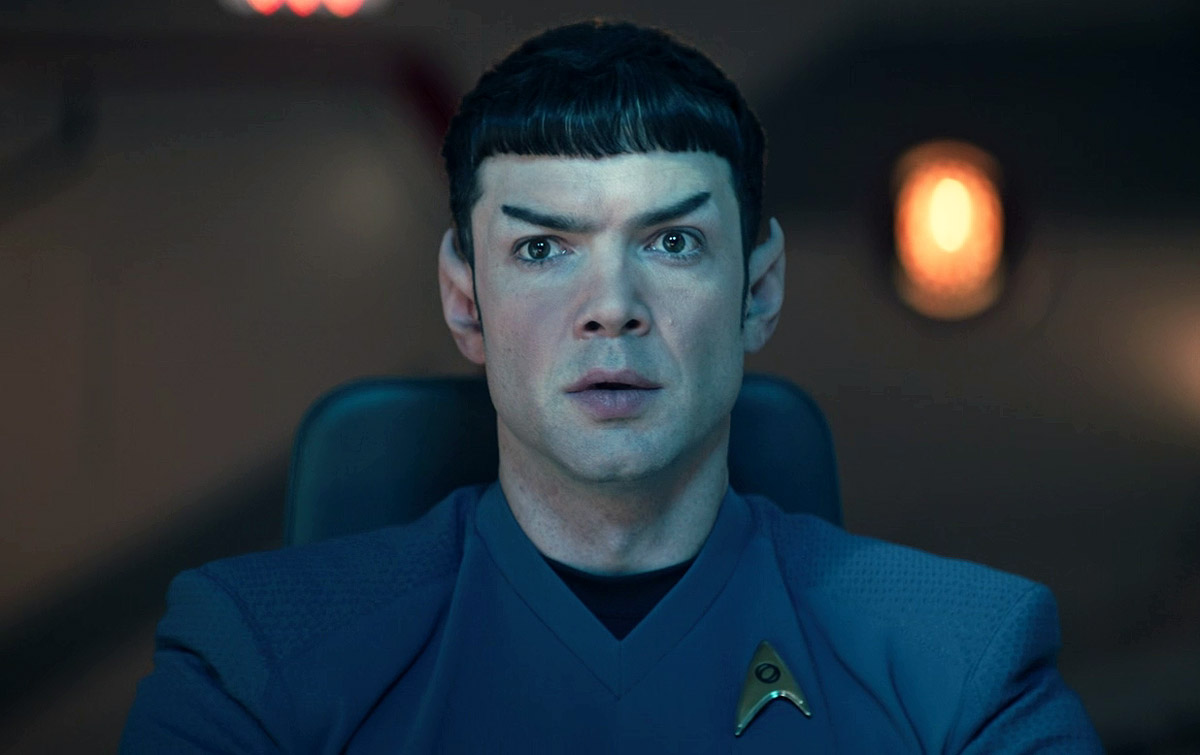
Thankfully, Spock wakes up on the Enterprise, seemingly unharmed… until the reveal that he’s now fully human! We learn that the energy-based Kerkhovians tried to repair Spock’s injuries from the shuttle accident, and found his Vulcan DNA to be an anomaly — comparing him to the all-human Chapel — and “helpfully” removed that part of his genome before returning the shuttle back to normal space.
Honestly, I can live with this interdimensional-being nonsense as an explanation for this, even if it is kind of stupid. Thankfully, no one aboard the Enterprise is even trying to argue that this could be a benefit to Spock — but he’s stuck like this for now, since the Kerkhovians seem to be unwilling to “heal” him another time.
And what does it mean for Spock? Seemingly, he’s not only lost his Vulcan genome, but he’s apparently lost his capacity to act like a Vulcan as well, missing all of those inherited cultural suppressants that Vulcans have. Ethan Peck gets to show off his comedy chops in a reasonably funny montage of Spock managing his new human forms of expression — including laughing, irritation, and alarmingly… bacon.
I like the idea that human emotionality is just too constant for Spock — and like any adolescent Spock must learn to tame them, much to the consternation of the crew.. thought I wonder how exactly La’an (Christina Chong) became the one to give him “the talk.”
Meanwhile, Chapel has her own problems: her interview with the Korby fellowship is a disaster, as the Vulcan Science Institute has little time for her fieldwork and “interpretation.” Spock offers some comfort in a very un-Vulcan way. (He’s learning to cope.)
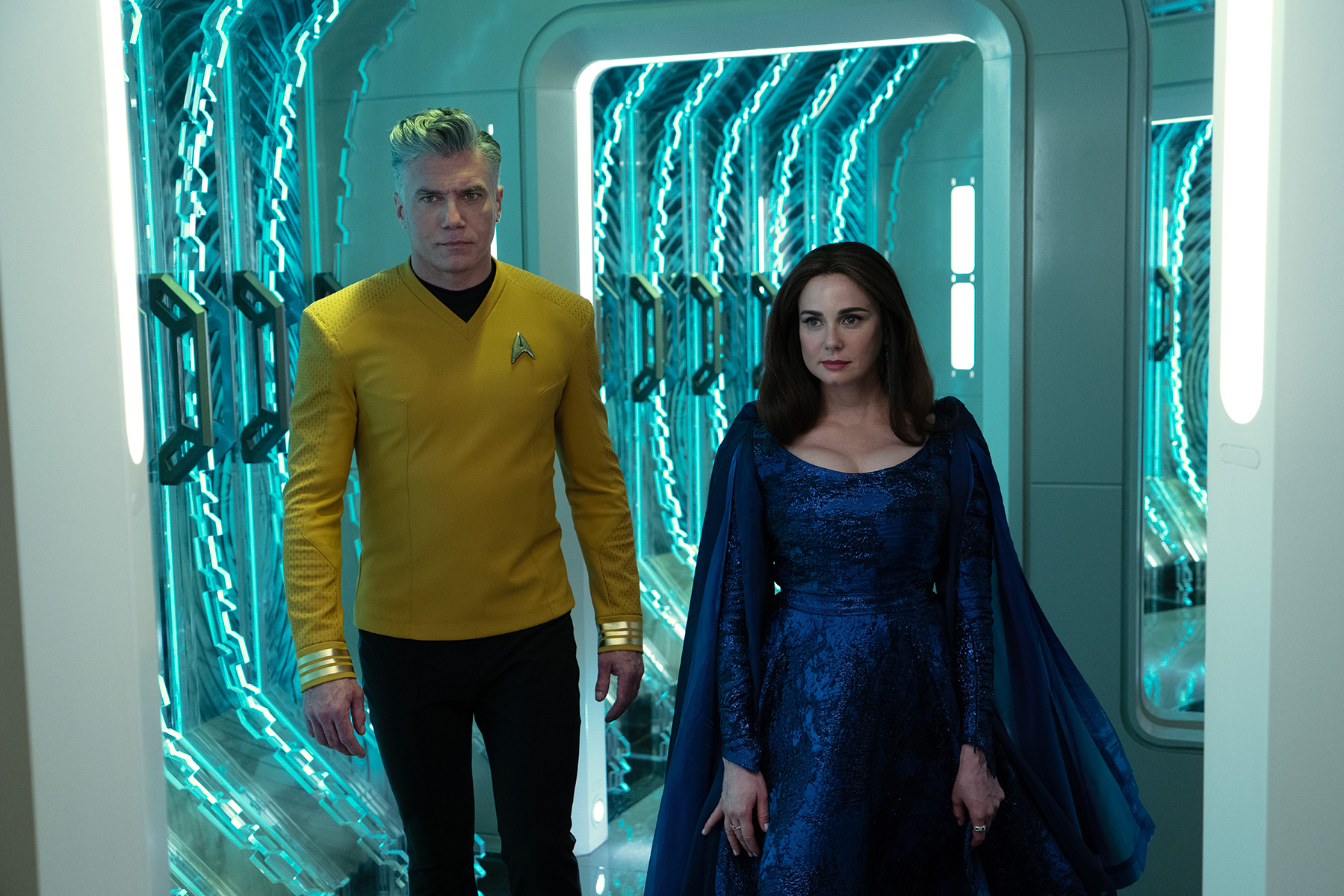
Their brief reunion is interrupted by the appearance of a new problem: Spock’s mother Amanda Grayson (Mia Kirshner) arrives, only to report that the engagement dinner is going to happen aboard the Enterprise!
Kirshner’s return after a four-year absence is a delight. Her interpretation of Amanda, last seen in Discovery’s “Such Sweet Sorrow, Part 2,” was brilliant and nuanced, and taking the opportunity to bring her back here was perfect. Amanda’s grace and wit, as well as her motherly tendencies towards Spock, are the perfect foil for Peck’s frantic, teenager-esque characterization of the now-human Spock — the sequence in the transporter room when Spock and Pike (Anson Mount) try to hide the predicament from her is brilliant.
With the tenuous relationship between Spock and T’Pring’s families on the line, the natural (and most hijink-heavy) choice is for Spock to finally learn the most important human characteristic of them all: how to lie to your in-laws! With coaching from both Amanda and his cremates, Spock must learn how to present as a typical Vulcan: handling superheated teapots, talking with the monotonous tone of logic, and trying (and failing) to manage his emotional outbursts during a V’Shal “improvement” session and a bogus mind-meld.
Things look dicey, butthe show must go on. After Chapel is unable to find a cure for his condition using Federation technology, she ropes in Uhura (Celia Rose Gooding) and Ortegas (Melissa Navia) into her mission to fly back to the Kerkhovians and demand that they take another look at Spock. In the meantime, T’Pring returns ahead of her difficult parents, as Spock does his best to act Vulcanly-normal. He succeeds in that feat, but fails to do the more important thing: tell her what’s going on.
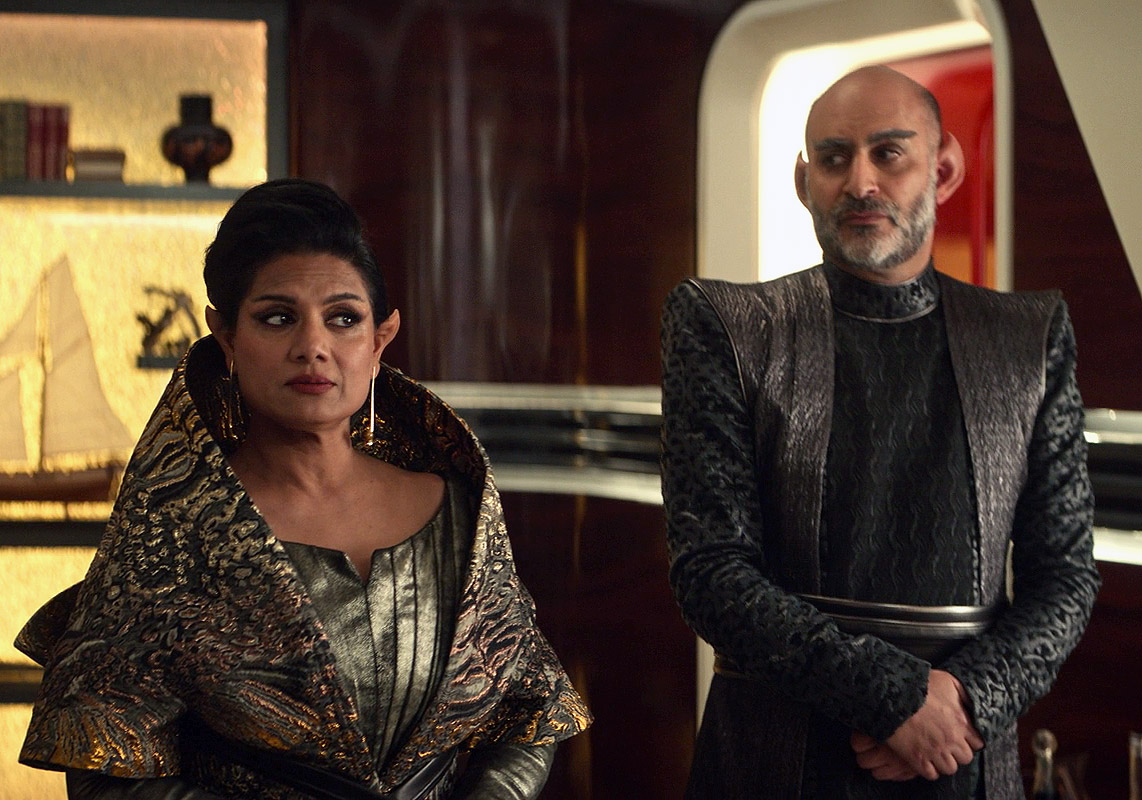
T’Pril (Ellora Patnaik) and Sevet (Michael Benyaer), T’Pring’s terrifying parents, are great! They are not complicated characters in any sense; drawn more from the cookie-cutter in-law stereotypes of The Dick Van Dyke Show, I Love Lucy, and Bewitched era, but with a Vulcan twist. And honestly? It works!
The whole set-up is a perfect storm of 60s sitcom tropes: the disapproving mother-in-law, the contrived rituals that have to be absolutely correct, the awkward doing-his-best host (Captain Pike), the easy to please but doting husband in Sevet. They are not particularly deep characters, but they are interesting; certainly T’Pril’s aloof arrogance towards strangers — and family — explains a lot about T’Pring’s own temperament.
As Spock claws his way through the rituals, Chapel, Ortegas and Uhura make their way to the Kerkhovian moon. Unable to ring through, Uhura suggests “wedging the door open” with a shuttlecraft, which seems to get the Kerkhovian’s attention. Unfortunately, they still don’t understand what they’ve done wrong, even as Chapel insists that they fixed him incorrectly.
Back on the Enterprise, the ritual only gets worse as they enter the “improvement” stage, which seems to mainly consist of T’Pril being mean to everyone in the room — but primarily Spock, who she eviscerates as being wholly inadequate for her daughter. T’Pril’s attitude is characteristic of a lot of Vulcans we’ve met over the years, and if we are to assume that this viewpoint is fairly normal among the Vulcan population (as we’ve seen again and again), it certainly underlines the difficulty and nuances of Spock’s dual identity.
Spock himself struggles a lot here, and I do to. T’Pril sucks; her attituded towards Spock’s complicated identity is infuriatingly realistic and recognizable to many people, and the way in which you just have to put up with it, even when you know it shouldn’t be how things go.
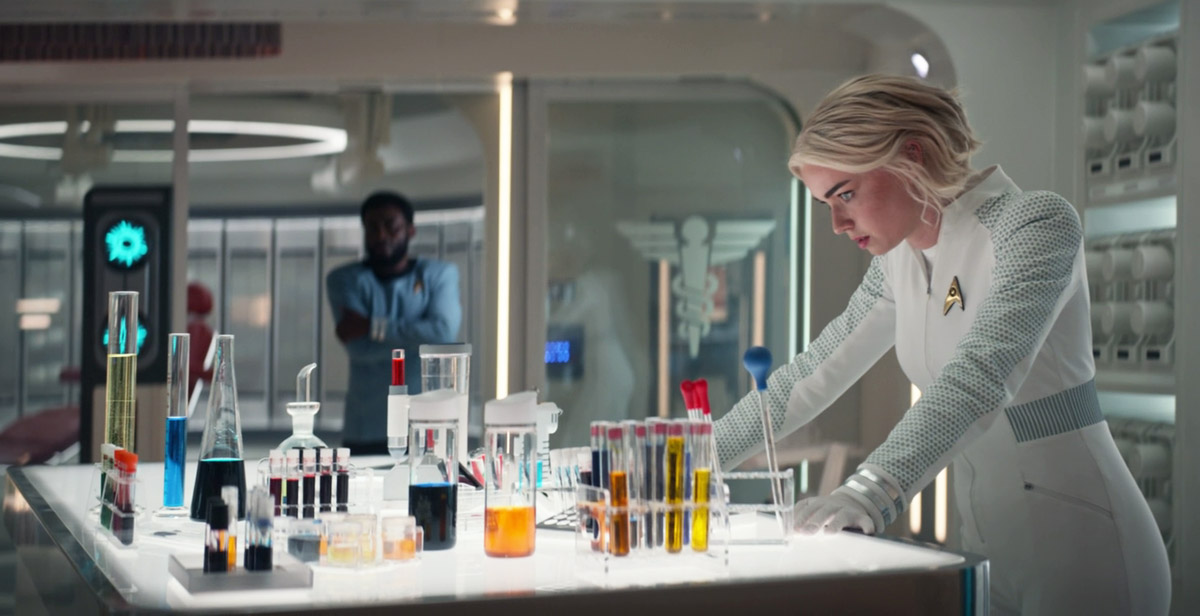
The tone stays with us as we go back to Chapel, Ortegas and Uhura. Stuck in interdimensional space, Chapel pleads with the Kerkhovians to fix Spock, but they remain unconvinced.. though not as unconvinced as Ortega and Uhura about Chapel’s “just friends” claim when it comes to Spock. As Chapel pleads for their action, the Kerkhovians (and her friends!) force her to confront how she feels about Spock in the open, and how important he — all of him — is to her.
With time running out before the fateful and un-fakeable mind meld, Pike attempts to stall with an ancient Earth ritual: charades! This gives Chapel just enough time to arrive with Spock’s much-needed “vitamins.” In the bathroom. Yeah, I can understand T’Pring’s suspicions, even if Chapel is only there to fix Spock before either of them can act on their impulses.
With his internal Vulcan genetics restored, Spock can mind-meld with his mother, sharing the memory of school day; finally, it appears that T’Pril is content with Spock… until she shares her own bigoted views on Spock’s “faults,” pointedly marking down his human side for its inability to conform to Vulcan ritual.
This gives Spock the opportunity to reveal that he’s been human the entire time, thanks to the timely removal of his fake ears. It’s a nice moment, especially for the support Spock shows to Amanda for putting up with the absolutely nonsense that people like T’Pril throw at her. Since “Journey to Babel,” there has always been this undertone in Amanda’s character that she has to suffer through a lot of Vulcan bigotry to get by as Sarek’s wife, and the overt acknowledgement of that is a good writing moment.
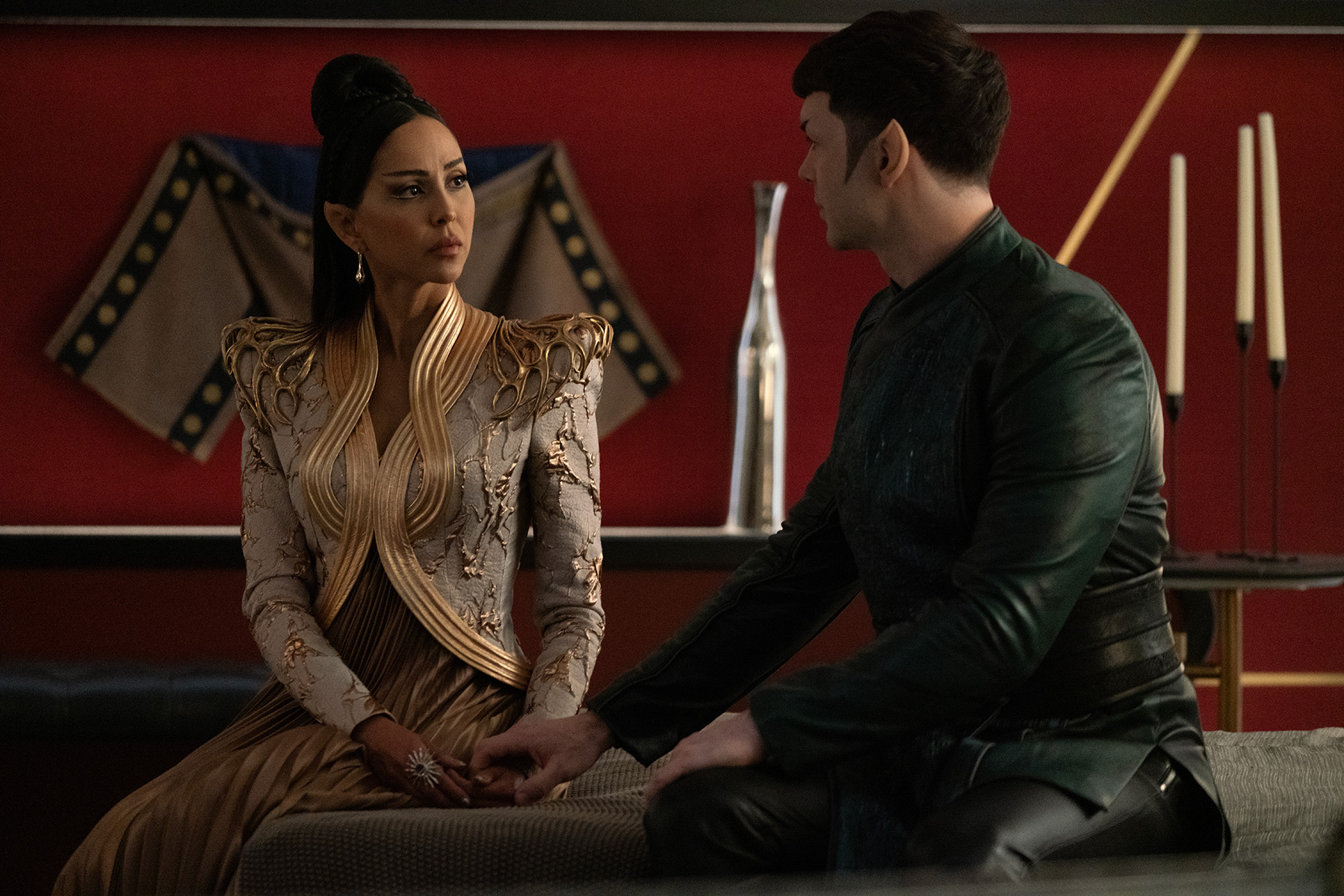
The aftermath of the reveal is a little laboured. Spock is back to normal, but his relationship with T’Pring is significantly damaged. Unhappy that everyone on the ship — except for her — seems to have known about his predicament, she decides that now that they’ve appeased their families, they should probably spend some time apart. Which, sure. That will help.
Spock’s own conflict is helped in some way by the final conversation with his mother. The details on the memory they shared in the mind-meld — of the first time Vulcan children let Spock play with them — is bittersweet, especially as they discuss how difficult Amanda’s time was.
Then, of course, Chapel and Spock face up to each other’s feelings. Events have forced each of them to face what the other feels, and what they represent to each other. It goes about as well as you’d expect, with the will-they-won’t they of the last 10 episodes finally reaching some catharsis. I guess someone out here was asking for this — I certainly wasn’t — but it seems that Strange New Worlds has committed to the pairing… at least, until Roger Korby comes into the picture.
“Charades” is just fun! It’s also a well-written comedy that doesn’t treat the allegorical bigotry lightly, even if that part of things could have been handled a bit more seriously. But this wasn’t a serious episode, and it’s quite clear that we really shouldn’t think too hard about the dynamics of Vulcan biology or Kerkhovian medicine; it’s just a show, we should really just relax.
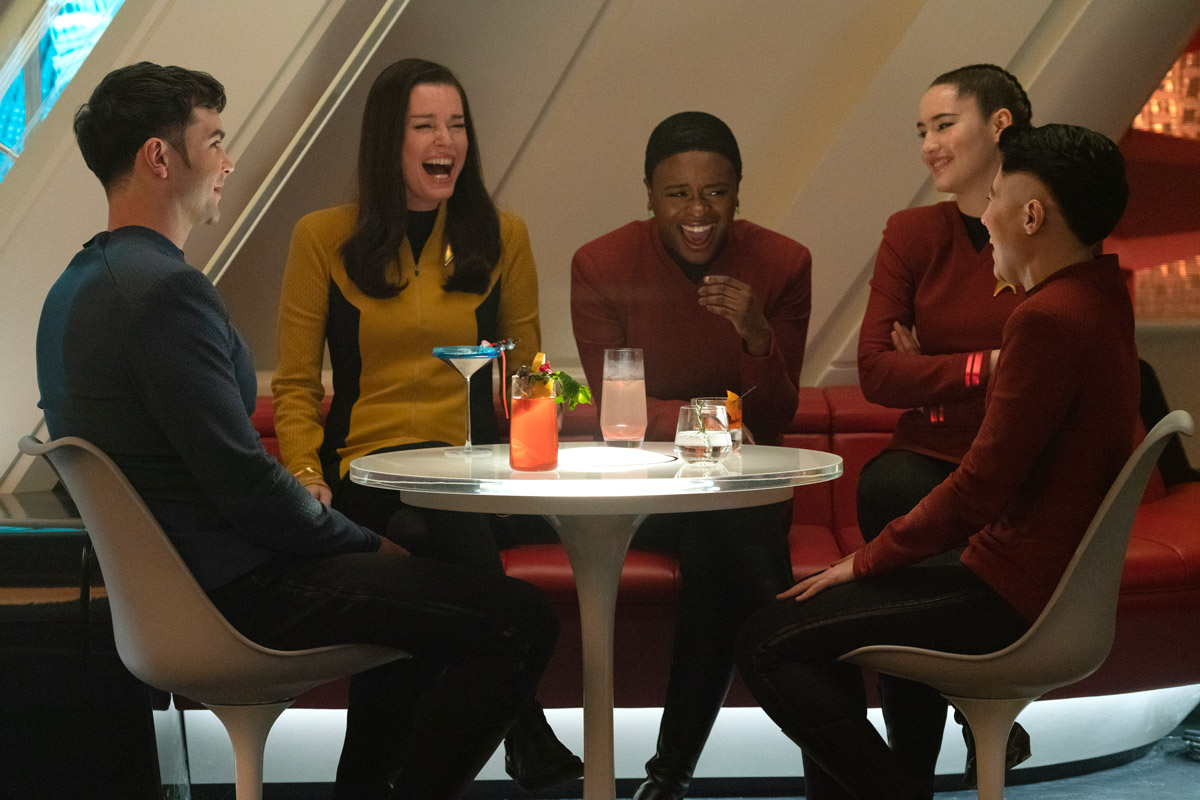
That said, there are definitely some points that I need to talk about, given how this episode treated Spock’s multiracial identity. Since the the first preview clip for “Charades” dropped last week, there’s been a significant level of discourse in some circles around the idea of splitting Spock — or the idea that you can make a mixed-race person into “one or the other” genetically.
Speaking as a mixed-race person myself, someone who has had their identity essentialized to one half or the other by different people through my life, that’s not fun, and it’s not something to encourage or support. “Charades” doesn’t support that essentialism: the whole idea that the Kerkhovians can “remove” his Vulcan genetics is annoyingly supported by Trek canon — the Vidiians did it to B’Elanna Torres in “Faces — but unlike that nightmare of an episode, we’re not dealing here with a character lamenting their dual heritage.
The entire character of T’Pril exists to remind us how narrow-minded that sort of viewpoint is, and how Spock cannot be boiled down to being “Vulcan enough” for his mother-in-law. We’re not meant to agree with her viewpoint, and we’re not meant to think the Kerkhovian’s “remediation” is acceptable at any level. Despite that text, however, I am so tired of this trope — because even subversion and criticism of splitting a multi-racial person means accepting that in Star Trek, such a thing is possible. You can’t split me into an Irishman and a Trinidadian; that’s not how I work. Even if you could put me in a transporter and beam the “Irish” out of me, you’d still end up with… me.
And I think the episode does that, in a sense — altered Spock still has all of Spock’s own personality quirks, his awkwardness, his curiosity and his temperament — but in other ways, it feels off. This Spock is meant to be wrong. He’s meant to be incomplete and unformed; as La’an says, he’s closer to an adolescent teenager than anything else.
I didn’t find this episode’s set-up particularly offensive, but this trope needs to be put to bed. As much as the conflict between his human and Vulcan “halves” is interesting, I think exploring that internally is much more interesting than exploring them in this external manner.
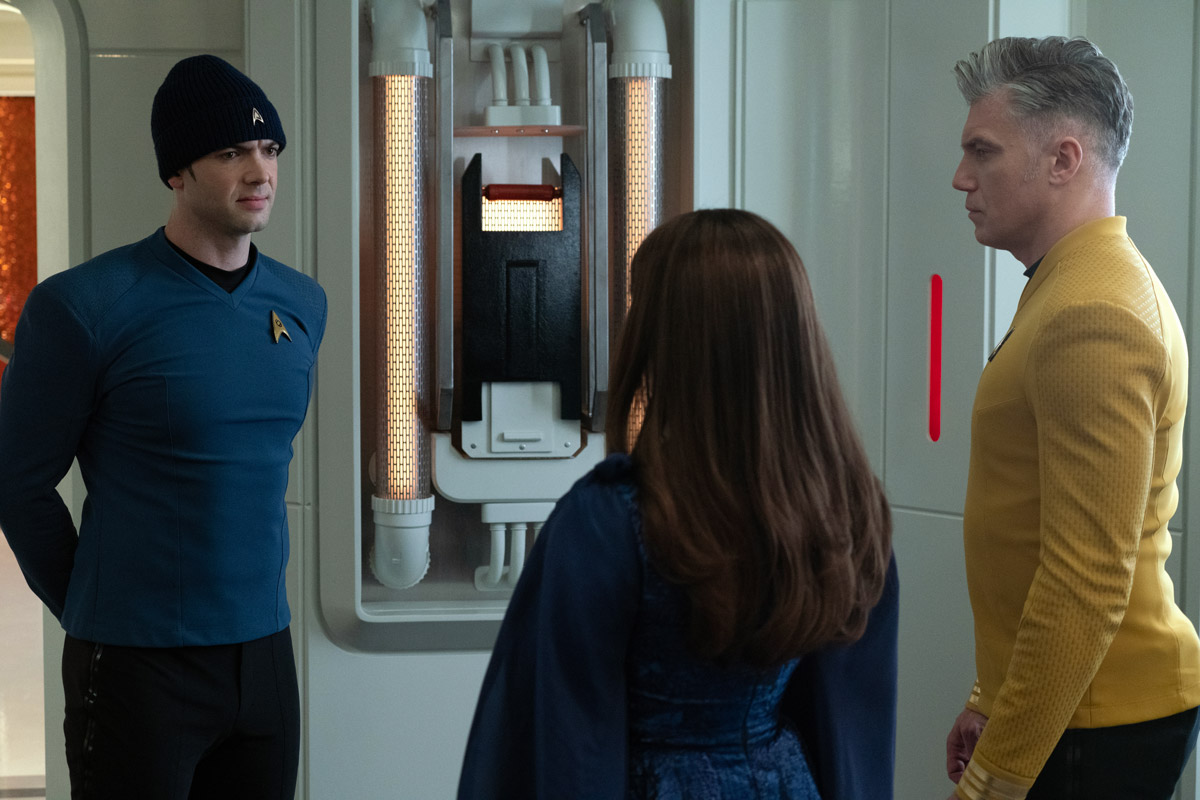
CAMP NONSENSE OF THE WEEK
There were plenty of contenders this week! Strong consideration went to Pike’s contorted looks of pain throughout the entire V’Shal ceremony — and to the bridge crew coaching Spock on how to ‘speak Vulcan’ — but this week we have to give it to Ethan Peck’s performance.
He managed to bring plenty of hilarity in his de-Spock-ified performance, but never lost science officers key characteristics.
OBSERVATION LOUNGE
- This episode brings us the first Strange New Worlds-era mention of Dr. Robert Korby, who would eventually become Christine Chapel’s romantic partner and fiancé in the years ahead of “What Are Little Girls Made Of?” Considering other developments in Chapel’s love life, I am intrigued as to how he’ll fit in here.
- The episode also mentions the ongoing rift between Spock and Sarek, which won’t be resolved until “Journey to Babel” — an episode set eight years into the future.
- Spock’s hat ploy with his mother is a clear homage to the multiple occurrences of Vulcan ears being hidden with beanies or other caps, though this time with a twist: it’s to hide his lack of pointed ears.
- Pike’s wearing the green wrap again, but this time it appears with a more formal look. I hope every season has a “Spock hijinks and green wrap” fifth episode!
- Pike’s delight at watching Spock taste bacon — while a funny moment — seems a bit cruel, given how much we know about how much Vulcans detest eating animal flesh.
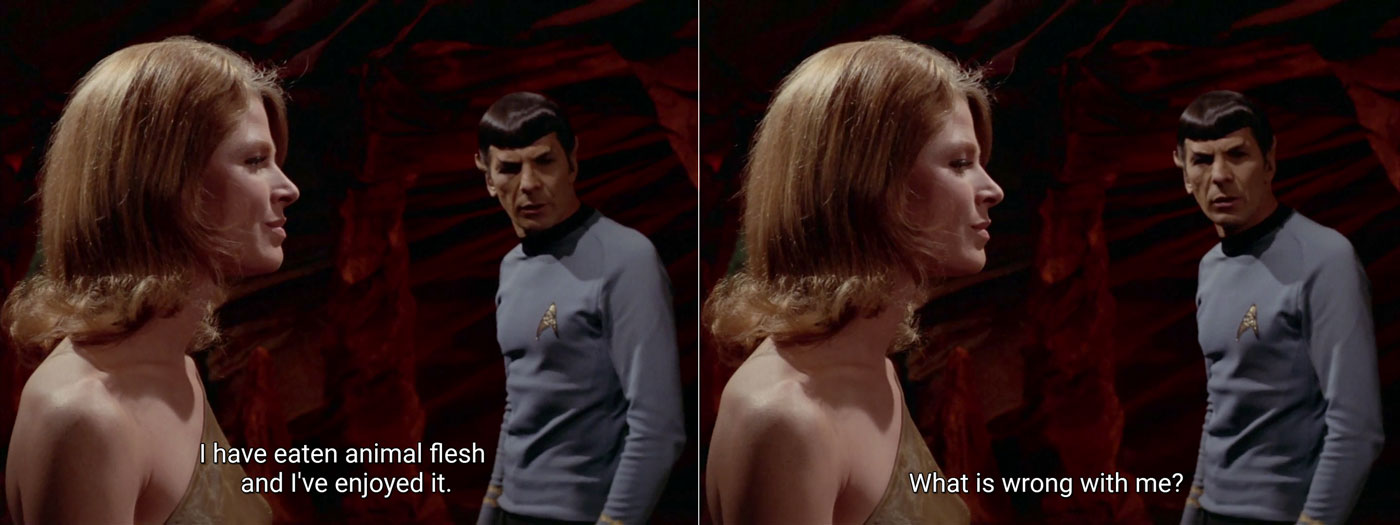
Once again, the Strange New Worlds cast proves that they can do comedy just as well as they do drama, all without losing the edge on the more serious elements of the plot. Even as someone who does not enjoy this whole Spock/Chapel thing, it’s well-scripted and well-acted; Bush and Peck sell the romantic tension and awkwardness, and the payoff at the end is earned.
I am interested in long – and how far – the writers intend to go with this, considering that this relationship can’t last too long with with what we know about Chapel’s romantic future. Having T’Pring break things off with Spock because he can’t confide in her also works well; you can see how this will lead to her attitude in “Amok Time” already.
Star Trek: Strange New Worlds returns with “Lost in Translation” on Thursday, July 20 on Paramount+ in the U.S, the U.K., Australia, Latin America, Brazil, France, Italy, Germany, Switzerland and Austria.
No comments:
Post a Comment